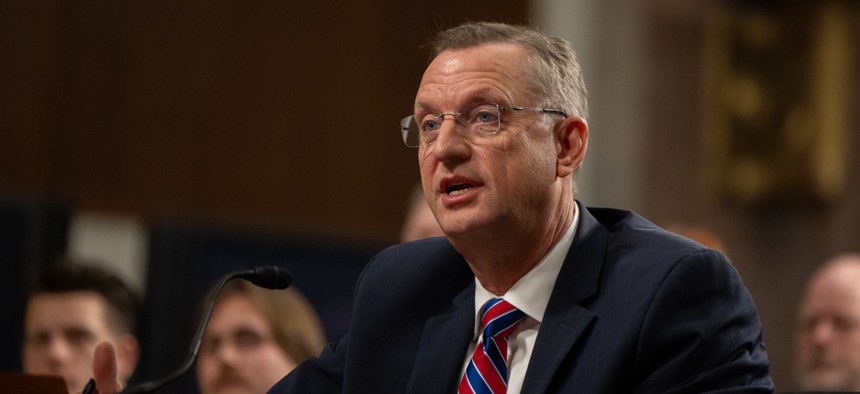
Doug Collins speaks at his VA secretary confirmation hearing in front of the Senate's Veterans Affairs Committee in Washington, DC, United States on Jan. 21, 2025 Nathan Posner / Anadolu / Getty Image
VA is selectively enforcing Trump’s order stripping workers of union rights
VA Secretary Doug Collins this week issued a notice allowing employees at the department whose unions have not been involved with lawsuits against the Trump administration to retain their collective bargaining rights.
Updated April 19 at 10:34 a.m. ET
The nation’s largest federal employee union reiterated its allegations that the Trump administration is retaliating against labor groups for challenging its workforce actions in court, after the Veterans Affairs Department moved to exempt a few small unions from a policy stripping two-thirds of the federal workforce of their collective bargaining rights.
Last month, President Trump signed an executive order citing a rarely used provision of the 1978 Civil Service Reform Act to declare wide swathes of the federal government ineligible for collective bargaining under the guise of national security. In addition to the Defense and Homeland Security departments, Trump outlawed unions at agencies as far-flung as the Environmental Protection Agency and the Federal Communications Commission.
Prior to Trump’s action last month, the CSRA’s national security exemption applied almost exclusively to the intelligence community and some federal law enforcement. Since the edict, the administration and unions have traded lawsuits over the policy, and federal payroll processors surreptitiously ceased collecting union dues from employees’ paychecks last week.
In a notice filed to the Federal Register Thursday, VA Secretary Doug Collins said that he “concurred” with the president that his department, whose mission is to provide health care and other support services to former military service members, “has as a primary function national security work” precluding employees from having collective bargaining rights.
But the same notice, without explanation, exempts eight small labor groups within the VA from Trump’s edict, effectively allowing them to retain their collective bargaining rights. Those unions include the Laborers International Union of North America, the Western Federation of Nurses and Health Professionals, the Veterans Affairs Staff Nurse Council Local 5032 in Wisconsin, the International Association of Firefighters in Arkansas, the Teamsters Union Local 115 in Pennsylvania and the International Association of Machinists and Aerospace Workers in Hawaii.
While Trump’s order exempts law enforcement and firefighter unions from losing their collective bargaining rights, that exception would apply only to the IAFF local.
The American Federation of Government Employees said these exemptions are further evidence that the edict was retaliation for unions suing the administration to block various workforce policies and actions, from the Deferred Resignation Program and the mass firing of probationary workers to legal challenges seeking to block the closure of the U.S. Agency for international Development, the Consumer Financial Protection Bureau, as well as the reinstitution of Schedule F.
All of VA’s unions that were not listed among Collins’ exemptions, including AFGE, the National Federation of Federal Employees, the National Association of Government Employees, the Service Employees International Union and National Nurses United, have been engaged in at least one legal challenge against the administration’s workforce policies.
“AFGE members at the VA, a third of whom are veterans themselves, have exercised their union rights through wars, terrorist attacks, a global pandemic and the entirety of Trump’s first term without incident,” said AFGE National President Everett Kelley. “[This] has nothing to do with national security and everything to do with retaliation against AFGE, the independent labor movement in America, and the veterans we serve at the VA. That’s made clear by Secretary Collins’ absurd, preposterous claim that AFGE-represented cemetery workers, housekeepers, cooks, mechanics, nurses and other health care employees are engaged in national security work, but those same groups of employees represented by other unions are not.”
In a statement, VA spokesman Pete Kasperowicz seemingly confirmed that the larger unions are being targeted for their lawsuits.
"The unions in the exempted units have posed no or minimal hinderance to VA operations," he said. "They have filed no or few grievances against VA and they have not proved an impediment to the department's ability to effectively carry out its mission . . . AFGE, NAGE, NNU and SEIU by contrast are using their authority under the Federal Service Labor-Management Relations Statute to broadly frustrate the administration's ability to broadly frustrate the administration's ability to manage the agency."
AFGE's outcry comes as more lawmakers on both sides of the aisle emerged to criticize the effort to bust most federal employee unions. In a letter Thursday, Sens. Brian Schatz, D-Hawaii, Susan Collins, R-Maine, Lisa Murkowski, R-Alaska, and Mark Warner, D-Va., urged the president to rescind the order.
“In many federal agencies, collective bargaining has served to strengthen and advance the mission of the agency by providing a structured channel for communication and addressing employee concerns,” they wrote. “The presence of collective bargaining rights has created a more stable and productive workforce and has allowed the federal government to better meet the needs of our constituents. Further, sudden changes to labor-management relations are disruptive to the work of the federal workforce and will result in the loss of valuable federal workers with knowledge and skills critical to completing their respective agency’s missions.”
How are these changes affecting you? Share your experience with us:
Eric Katz: ekatz@govexec.com, Signal: erickatz.28
Erich Wagner: ewagner@govexec.com; Signal: ewagner.47
NEXT STORY: Mass layoffs paused at Consumer Financial Protection Bureau







